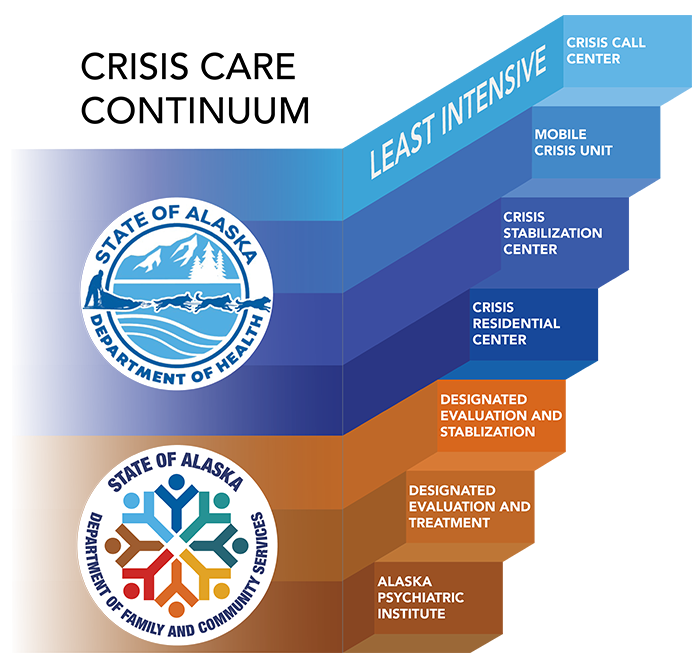Civil Commitments and the State of Alaska
When an individual presents a likelihood of serious harm to self or others or is gravely disabled as a result of mental illness, they may be placed under an involuntary commitment order, also known as a Title 47 Order, if petitioned on by a community member, medical or mental health professional.
Due to the mental health needs in the community and a limited number of beds available at designated facilities statewide, there may be a waitlist for Civil Commitment Respondents to be accepted into a facility. Efforts continue to be made to reduce wait time for all individuals on Civil Commitment holds through increased communication and training for all parties involved in the Civil Commitment process.
The laws regarding civil commitment are
AS 47.30.660-.915.
Crisis Now Model in Alaska
The
Alaska Mental Health Trust Authority (the Trust), the
Department of Health, and the
Department of Family and Community Services, and a multitude of other partners are working together to implement improvements to Alaska’s system of care that responds to individuals experiencing a behavioral health crisis using the nationally recognized Crisis Now model as a framework.
In 2022, HB 172 was enacted which established the Crisis Now model and expanded the care continuum for behavioral crisis response. In essence, the expansion added additional levels of care that are less intensive than the in-patient settings such as the
Alaska Psychiatric Institute and the designated facilities.

The crisis care continuum is not a linear continuum. An individual may start anywhere along the continuum and a more intensive service is not necessarily the next step in addressing a mental health crisis. The least intensive service that an individual in Alaska can access is the 988 call center hotline. Individuals in crisis may call 988 and be connected with emergency mental health services, including suicide prevention. If needed, a mobile crisis unit may be sent out to the individual to assist with stabilization or connection to other resources. Currently, Alaska does not have a mobile crisis unit in every community, but more communities are planning on offering this service. The least intensive facility on this continuum is the crisis stabilization center which offers stabilization services that are less than 24 hours in length. If an individual needs to stay longer, but can be stabilized within 7 days, the crisis residential center is the facility to offer that service. The crisis residential center is meant to be an alternative to involuntary hospitalization, but can accept individuals on an involuntary commitment order for evaluation if the facility is designated. The services described in this paragraph are all administered by the Department of Health.
If an individual needs a more restrictive environment, or has an involuntary commitment order, they may seek services at a designated facility or the Alaska Psychiatric Institute (API). The Department of Family and Community Services designates facilities to become either evaluation and stabilization (DES) or evaluation and treatment (DET) facilities. A DES is a hospital or crisis residential center which conducts evaluations on individuals for the purposes of involuntary commitment. A DET is a hospital which offer evaluation and treatment services for the purposes of involuntary commitment. API is the state-run psychiatric hospital which accepts individuals who are the most acute and need the most intensive services. These patients may be admitted voluntarily or involuntarily.